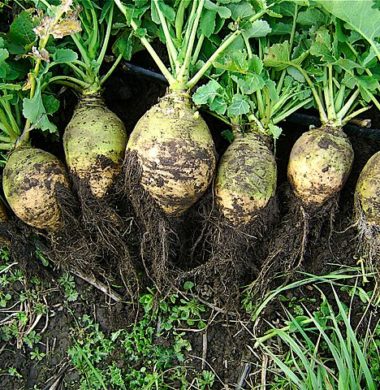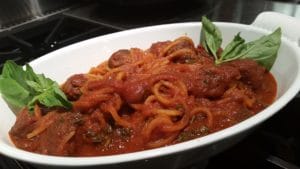Pasta Made from Vegetables! Flourless, gluten free “pasta” from raw veggies

Richard E. Collins, MD
THE COOKING CARDIOLOGIST®
Welcome to the era of no carbohydrates, gluten intolerance and “no white foods”. Pasta is hanging out there on a limb.
While carbohydrates add up, Americans just eat too much of it. In Italy, it is a side dish and portioned exactly, not the main player on the plate. But not in America! We have buffets and restaurants advertising endless pasta dining. In fact, one restaurant advertises…“order a pasta dish and take a second one home for free”.
Here is a twist on taking down the carbohydrates and still enjoying the sauces and tastes of Italy.
The secret is to have a spiralizer in your kitchen. This is a “must have” gadget that will create strands of pasta made from vegetables. There are a number on the market and often advertised on TV after midnight. Don’t buy those gadgets. Purchase a good quality machine. Do your home work. My favorite is the Gefu Spiralfix Spiral Slicer.
Spaghetti from Rutabagas
Scrub two rutabagas, removing dirt and debris. Peel and trim both ends. Place into a spiralizer and create long stands of spaghetti. Place into a large bowl. Squeeze the juice of 1 lemon over the cut rutabagas to remove the bitterness. Let stand for 20 minutes, tossing to coat. Bring 2 quarts of salted water to a boil. Add the rutabagas and boil like pasta for approximately 8 minutes, al dente. Immediately plunge into an ice water bath to stop the cooking process. When cooled, drain. Place into a bowl and add 1T olive oil. Toss to coat. The “rutabaga pasta” is ready to be added to the heated sauce of your choice.
Makes approximately 10 ounces, 2 cups, 4 servings.
2 ounces of dried pasta has approximately 200 calories. 2 ounces of rutabagas have 22 calories.
Other veggies you can substitute for pasta are:
- Eggplant instead of lasagna noodles
- Zoodles from Zucchini
- Spaghetti from Squash
- Couscous from Cauliflower
Bon appetite! Heart Healthy!
- Lifestyle Changes That Can Help Manage Arrhythmia - April 30, 2025
- Common Treatments for Peripheral Vascular Disease - April 23, 2025
- Are Ultra-Processed Foods Bad for Your Heart Health? - April 14, 2025
Sign Up
As with any health concerns, your specific treatment program should be discussed thoroughly with your primary care physician as well as any specialists who may need to be consulted – like a cardiologist.
Sign Up

